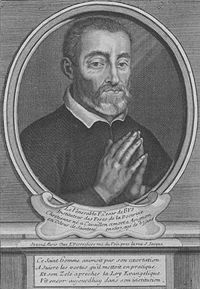- César de Bus
-
César de Bus 
Born 3 February 1544
Cavaillon, Comtat Venaissin (now in France)Died 15 April 1607
Avignon, FranceHonored in Roman Catholic Church Beatified 27 April 1975[1], Saint Peter's Basilica, Vatican State by Pope Paul VI Feast April 15 Blessed César de Bus (b. 3 February 1544, at Cavaillon, Comtat Venaissin (now in France); d. 15 April 1607, at Avignon) was a French Catholic priest, founder of two religious congregations.
Contents
Life
At eighteen he joined the king's army and took part in the war against the Huguenots. After the war he devoted some time to poetry and painting, but soon made up his mind to join the fleet which was then besieging La Rochelle. Owing to a serious sickness this design could not be carried out.
Up to this time de Bus had led a pious and virtuous life, which, however during a sojourn of three years in Paris was changed for one of pleasure and dissipation. From Paris he went back to Cavaillon. Upon the death of his brother, a canon of Salon, he succeeded in obtaining the vacated benefice, which he sought for the gratification of his worldly ambitions.
Shortly after this, however, he returned to a better life, resumed his studies, and in 1582 was ordained to the priesthood. He distinguished himself by his works of charity and his zeal in preaching and catechizing, and conceived the idea of instituting a congregation of priests who should devote themselves to the preaching of Christian Doctrine. In 1592, the "Prêtres séculiers de la doctrine chrétienne (Secular Priests of Christian Doctrine)" were founded in the town of L'Isle and in the following year came to Avignon. This institute's development into a religious congregation was approved by Pope Clement VIII, 23 December 1597. Besides the Fathers, De Bus founded an order of women originally called "Daughters of Christian Doctrine", which later came to be called Ursulines (not, however, a part of the major religious Order of that same name); it died out in the 17th century.[2]
Five volumes of his "Instructions familières" were published (Paris, 1666).
Pope Pius VII declared him venerable in 1821 and Pope Paul VI beatified him in Rome on April 27, 1975.
References
- De Beauvais, Vie du P. César de Bus (Paris, 1645);
- Dumas, Vie du P. de Bus (Paris, 1703);
- Helyot, Histoire des ordres religieux, revised ed. by Badiche in Migne, Encyclopédie théologique (Paris, 1848), XXI;
- Johann Nepomuk Brischar in Kirchenlexikon, III, 1873, s.v. Doctrinarier;
- Baillet, Les vies des saints (Paris, 1739), III, 617;
- Heimbucher, Die orden und Kongregationen der kathol. Kirche (Paderborn, 1897), II, 338.
Notes
References
- Attribution
 This article incorporates text from a publication now in the public domain: Herbermann, Charles, ed (1913). "Ven. César de Bus". Catholic Encyclopedia. Robert Appleton Company.Categories:
This article incorporates text from a publication now in the public domain: Herbermann, Charles, ed (1913). "Ven. César de Bus". Catholic Encyclopedia. Robert Appleton Company.Categories:- 1544 births
- 1607 deaths
- People from Cavaillon
- French Roman Catholic priests
- Beatified people
- 16th-century Roman Catholic priests
- 17th-century Roman Catholic priests
- 17th-century venerated Christians
Wikimedia Foundation. 2010.
